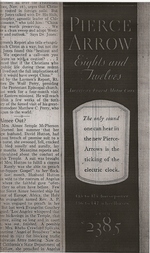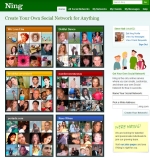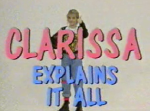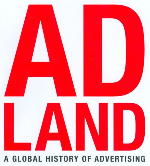If you think strange homages and coincidences in advertising creative are a new thing, you would be mistaken. Writing on Freaking Marketing, Robert Rosenthal shares with us the fact the famed David Ogilvy-created Rolls Royce headline, "At 60 miles an hour the loudest noise in this new Rolls-Royce comes from the electric clock" wasn't exactly original. Perhaps this is common knowledge is some circles but it's the first we've heard of it.
In a very level headed examination, Rosenthal explains how a headline, "The only sound one can hear in the new Pierce-Arrows is the ticking of the electric clock" appeared in a Pierce Arrow print ad in 1932, many years before it appeared in a Rolls Royce ad. It's nearly identical to the Rolls Royce headline.
Certainly Ogilvy was old enough to have seen the ad but, as we've seen many times before, coincidences happen and even if work plays off former work, it's usually done, as Rosenthal points out, simply to accomplish whatever the campaign set out to do. While everyone likes to say there are no new ideas today perhaps they've been gone for over 50 years.
UPDATE: In comments, Rosenthal, after digging deeper, tells us the headline may have come from the Technical Editor of a magazine called The Motor. Oddly, it sounds like we may have known this before but don't count on our brain cells for much. We're just sharing the facts as they present themselves.
Ahh. Here's what Profitable Marketing Communications aspired but failed to be because the authors were too busy trying to be memorable writers. Jason Burby and Shane Atchison make no such pretension.
Actionable Web Analytics reads more like a textbook than an indulgent marketing tourguide. Its lessons are practical, actionable, simply explained and well-illustrated.
Buy it. You don't even have to read it; if it's on your shelf, you'll actually seem smarter. We'll even overlook the fact that co-author Shane looks like a hipster.
Believe it our not, everyone that writes for Adrants does not, contrary to popular belief, live in New York. So revel, herewith, in the story of Angela as she masters the art of traveling on an Adrants budget as opposed to an Advertising Age budget which, for Adrants readers, is a very good thing.
After all, do you want the highly-edited, overly-tame version of Advertising Week - or do you want the gritty reality of life in the big city as seen by someone like you: People without huge expense budgets who go from glitzy hotel to cab to advertising conference and back again without reveling in everything New York has to offer? Read on.
You never know when you'll need the skills necessary to support your survival (and cool factor) if you happen to find yourself at a youth hostel during Advertising Week on a (trendy) Bohemian budget. And after three days doing it, I'm a PhD. Read on to glean the fruits of my loving labors:
1. Buy a map. This serves two purposes: locating all the 1 Line stations in Manhattan, and all the shot-in-the-dark buildings the Advertising Week people chose for the seminars (couldn't one location have done the job?).
If colleagues ask why you never take a cab home, say nonchalantly that you know the Subway like the veins on the back of your writing hand. They'll be impressed. Or at least they'll look like they are.
more »
We really wonder if people do their homework before launching what they believe will become something akin to the next YouTube. The idea of commercials as content has been done many times before and has failed each time. However, the recently launched Firebrand doesn't seem to care and believes its offering of the "coolest" commercials served up MTV VJ-style will connect "consumers directly with their favorite brands in an integrated environment." How many billions of time have we heard that before?
We tried really hard not to laugh when Firebrand CEO Roman Vinoly said, "We program TV spots like a DJ spins music in a club. There is a rhythm and flow to it." In an attempt to spin Firebrand as something other than a massive database of commercials, Vinoly adds, "On Firebrand, you'll see more car chases, explosions, gags, drama, heroes, Oscar-winning actors, directors and producers in an hour than in a month of HBO." Right, dude. They're still fucking commercials. Not The Sopranos.
more »
Copyranter directs our attention to yet another gratuitous use of ass in advertising. With absolutely no relation to its purpose, the Technical University of Munich career forum chose to find hot booty, photograph it and display it purely to attract attention. Oh wait, that sounds like we're complaining. Because we're not.
Oh but wait! We are. We have to. It's out job. We simply must rail against the objectification of women (and their amazingly beautiful asses) in advertising. It's despicable. It's shameful. It's Neanderthal. It's a blight on the fine, upstanding morals of the advertising industry and absolutely will not be tolerated! It sickens us to think a fabulous piece of ass like this would be reduced to an OMFG-inducing ad.
more »
Ning, the Marc Andreesen-backed social network creation service, has reached 100,000 networks. Ning, which powers our own AdGabber social network, makes it easy and free for anyone to create their own social network without having to possess any technical skills. Writing on his blog, Andreesen describes Ning as a horizontal network of social networks which purposefully does not focus on or serve any particular vertical.
Andreesen describes the atmospheric growth of Ning as double viral, writing, "On Ning, users both join existing user-created networks -- one of the 100,000+ networks that already exist -- and/or create their own networks. This is a double viral loop. Loop one is users being invited to join a network created on Ning. Loop two is some percentage of those users creating their own new networks and then inviting other people to join those new networks."
more »
While conducting research for our last article, it came to our attention that there are a lot of bummed-out twenty-somethings sitting around making Nickelodeon tributes to shows they grew up with. (See more here.)
Why is no one -- least of all Nickelodeon -- exploiting this wellspring of self-obsessed nostalgia? If we saw Gumby or Inside-Out Boy pushing product at us, we'd be all over that in an irrational second.
And we'd possibly (though not probably) kill to see a marathon of Salute Your Shorts or something SNICK-like. We'd even revisit Hey Arnold! if we had to. Man. Remember when TV was good? Remember TGIF? WTF happened to TGIF?!
Bill over at Make the Logo Bigger weighs in on the use of kids to push causes that perhaps can't push themselves.
Should kids be involved in "adult" debates that have as much to do with their futures as ours? It's easy to say yes. But in cause-oriented ads, we often find them confidently taking positions fed to them by other adults (who should presumably be engaging in the discourse themselves).
By and large, kids depend our protection and sound judgment. One reason why The Exorcist and The Shining were so scary is that, when put in the position to strike fear or conviction into an adult, the young wield massive emotional force.
If the viewpoint of children makes us more emotional than critical, maybe we should indeed confine their marketing savvy to selling cookies, rather than selling political positions or causes.
We just thought it was interesting to note this video clip from the movie Network is even more relevant than it was thirty years ago when the movie debuted. This is the movie that gave us the famed line, 'I'm as mad as hell, and I'm not going to take this anymore!" In the clip, Peter Finch rails against the public which has been dumbed down by television and don't read books or newspapers any longer. Sound familiar?
Television is not the truth Finch tells us. "It's a goddamn amusement park." TV will tells us anything we want to hear and it will lie to deliver. Combine that with the rest of the media business's insanity and the our fixation with celebutards and the world depicted in the recent movie Idiocracy seems completely plausible.
more »
We're firm believers in that if you're going to devote your life to something, even something as "banal" as advertising, you should commit. Let yourself go. Fall in love with it. Learn it inside and out.
After reading Adland over the weekend, we're thinking, here's a book that finally lets you do that.
It's really hard to find a book on advertising that doesn't come off as worshipful and jam-packed with debauched ad men and images of half-naked women, or overly critical and almost caustic. These are all attempts to simplify the profession and shove it into a box it doesn't really belong in.
We get a sense that author Mark Tungate has as much of a love/hate relationship with advertising as anybody. Without ignoring or embellishing those feelings, he examines the industry as a chartable landscape with a unique history.
more »

|











